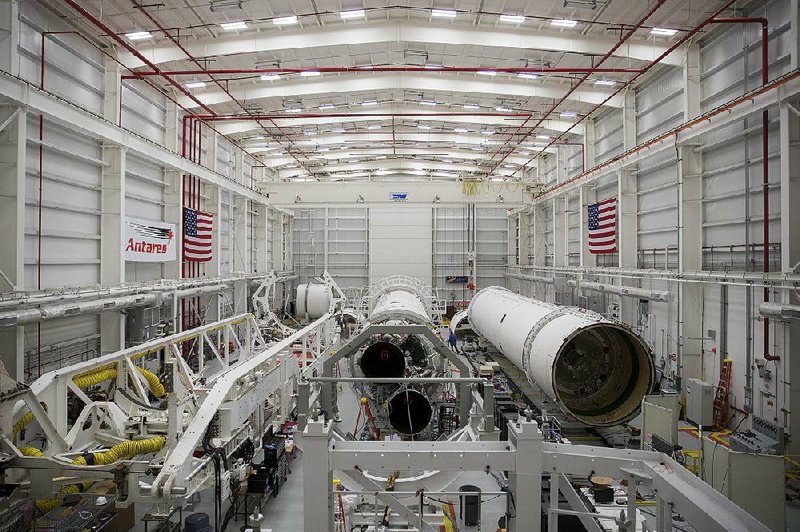WASHINGTON - Orbital Sciences Corp. looked like an also-ran in the space race about two years ago, eclipsed by billionaire Elon Musk’s startup venture.
Orbital was trading near its five-year low while Musk’s closely held Space Exploration Technologies Corp., or SpaceX, made history in May 2012 by docking a cargo ship at the International Space Station.
Last week, Orbital’s stock soared on plans to combine with Alliant Techsystems aerospace and defense businesses, tripling revenue and uniting two longtime launch partners. Alliant helps power the Antares rocket, key to Orbital’s growth in the estimated $7 billion market for building and launching midsized satellites and spacecraft.
“We’re still not going to be a $30 billion-level company, but we’ll be well-positioned in bringing the right combination of innovation and affordability,” David Thompson, chairman and chief executive officer of Orbital, said in a phone interview.
Thompson, 60, will be CEO of the new company, created by the year’s end in a $5 billion, all-stock deal. Shares, which sank to a fiveyear low in June 2012, have risen 75 percent in the past year, reflecting the company’s success in reaching the space station.
Unlike SpaceX, Orbital has no plans to jump into the riskier businesses of ferrying astronauts to the station or launching big military and spy satellites.
“There’s the Goldilocks effect here,” Thompson said during an April interview at the company’s headquarters in Dulles, Va. “You can fail by not reaching far enough, and you can also sometimes stumble by reaching too far.”
Orbital officials expect to boost sales in an austere federal-budget environment in part by focusing on midsized missions, which include the flights to the space station under a National Aeronautics and Space Administration contract.
The midsized missions accounted for roughly $350 million, or more than a quarter of Orbital’s sales last year. By the end of the decade, they may generate $1 billion, Thompson said.
Thompson said he doesn’t regret losing the opportunity to develop a commercial crew program for NASA. The agency instead has funded efforts by several companies to develop spacecraft capable of carrying astronauts - including SpaceX, Boeing and Blue Origin, a Kent, Wash.-based company founded by Jeff Bezos, CEO of Amazon.com.
“In retrospect, I think it’s actually probably been a good thing,” Thompson said. “It’s allowed us to really focus within the human-spaceflight market on the cargo program and make sure we’re doing a good thing there without also pulling resources away from our communications satellites and our military work.”
Orbital didn’t meet the criteria to compete for the large, Pentagon satellite launches, said Barron Beneski, a company spokesman. A joint venture of Lockheed Martin and Boeing dominates that $70 billion market, and Hawthorne, Calif.- based SpaceX on April 28 sued the military to try to break into the business.
Thompson’s focus is on the Antares rocket, which at 132 feet is as tall as a 13-story building and carries medium-sized payloads of up to 14,000 pounds to low-Earth orbit. Antares successfully launched the Cygnus craft to the space station in September under a demonstration flight. The vehicle made its first official supply run in January.
ATK’s propulsion systems power the second stage of the Antares rocket, and they also eventually may be used for the first stage, eliminating the need to use Russian-built engines.
Orbital’s next launch to the space station is June 6. The cargo deliveries are part of a $1.9 billion contract for eight resupply missions to the space station.
NASA is considering extending the contract for as long as two years, the agency said. Thompson told investors during an April 17 conference call that an extension might mean as many as four additional supply missions.
Orbital has the benefit of launching Antares from NASA’s Wallops Flight Facility on Virginia’s Eastern Shore. It has virtually unlimited access to the launchpad, a concrete structure extending 22 feet above the adjacent beach, while its competitors must wait for open dates at other locations.
The Virginia Commercial Space Flight Authority built the launchpad after Orbital agreed to launch the rocket from Wallops.
Thompson said Antares could be the logical successor to the Delta II rocket that now launches military and NASA satellites.
The Air Force is looking at using smaller satellites, which would “drive a market for smaller launch vehicles, significantly reducing the overall cost of acquiring additional space capabilities,” said Connie Dillon, a spokesman.
Antares’ success contrasts with Orbital’s back-to-back failures in 2009 and 2011 - when a predecessor rocket failed to place two NASA satellites into orbit. The agency absorbed most of the $700 million loss. They were Orbital’s only failures in a decade of almost 250 launches.
Orbital had $1.4 billion in sales last year, while Alliant’s aerospace and defense groups generated $3.1 billion in revenue.
The new company, which will be called Orbital ATK Inc., combines Orbital’s missile-defense systems and ATK’s tactical missiles. From ATK will also come its expertise in ammunition for the U.S. military. ATK’s other business, including its commercial ammunition and rifles, will be a separate company.
Business, Pages 21 on 05/05/2014
